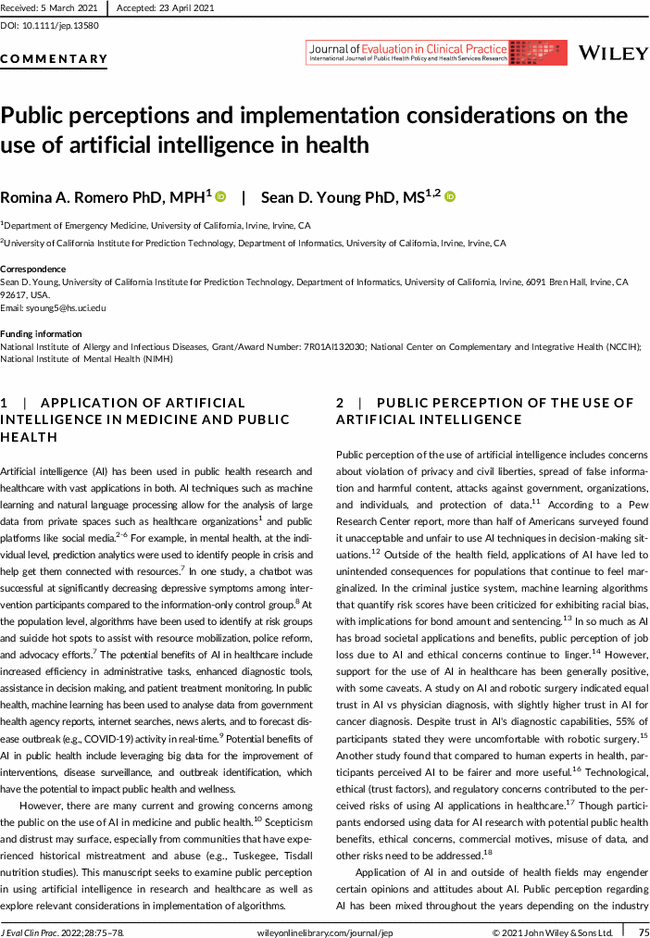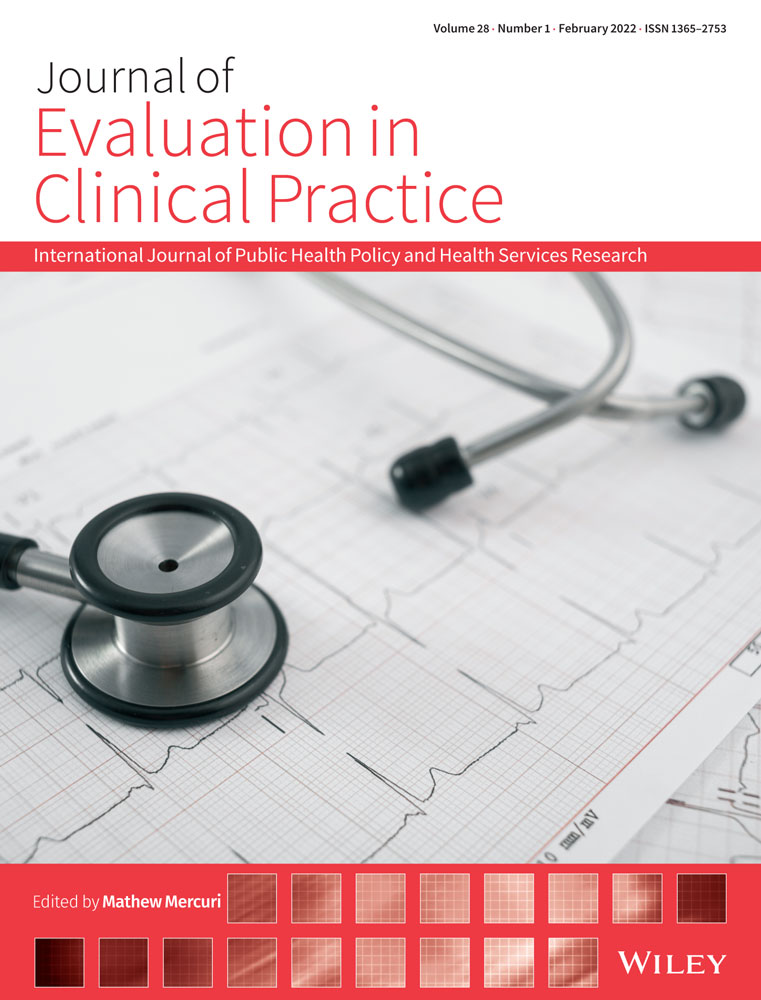Public perceptions and implementation considerations on the use of artificial intelligence in health
Romina A. Romero PhD, MPH
Department of Emergency Medicine, University of California, Irvine, Irvine, CA, USA
Search for more papers by this authorCorresponding Author
Sean D. Young PhD, MS
Department of Emergency Medicine, University of California, Irvine, Irvine, CA, USA
University of California Institute for Prediction Technology, Department of Informatics, University of California, Irvine, Irvine, CA, USA
Correspondence
Sean D. Young, University of California Institute for Prediction Technology, Department of Informatics, University of California, Irvine, 6091 Bren Hall, Irvine, CA 92617, USA.
Email: [email protected]
Search for more papers by this authorRomina A. Romero PhD, MPH
Department of Emergency Medicine, University of California, Irvine, Irvine, CA, USA
Search for more papers by this authorCorresponding Author
Sean D. Young PhD, MS
Department of Emergency Medicine, University of California, Irvine, Irvine, CA, USA
University of California Institute for Prediction Technology, Department of Informatics, University of California, Irvine, Irvine, CA, USA
Correspondence
Sean D. Young, University of California Institute for Prediction Technology, Department of Informatics, University of California, Irvine, 6091 Bren Hall, Irvine, CA 92617, USA.
Email: [email protected]
Search for more papers by this authorFunding information: National Institute of Allergy and Infectious Diseases, Grant/Award Number: 7R01AI132030; National Center on Complementary and Integrative Health (NCCIH); National Institute of Mental Health (NIMH)

CONFLICT OF INTEREST
The authors declare no conflict of interest.
Open Research
DATA AVAILABILITY STATEMENT
Data sharing is not applicable to this article as no new data were created or analysed in this study.
REFERENCES
- 1Marcus JL, Hurley LB, Krakower DS, Alexeeff S, Silverberg MJ, Volk JE. Use of electronic health record data and machine learning to identify candidates for HIV pre-exposure prophylaxis: a modelling study. Lancet HIV. 2019; 6(10): e688-e695. https://doi.org/10.1016/S2352-3018(19)30137-7.
- 2Young SD, Yu W, Wang W. Toward automating HIV identification: machine learning for rapid identification of HIV-related social media data. J Acquir Immune Defic Syndr. 2017; 74(Suppl 2): S128-S131. https://doi.org/10.1097/QAI.0000000000001240.
- 3Flores L, Young SD. Regional variation in discussion of opioids on social media. J Addict Dis. 2021; 1-8. https://doi.org/10.1080/10550887.2021.1874804.
- 4Zheng C, Jiang J-Y, Zhou Y, Young SD, Wang W. Social media user geolocation via hybrid attention. Paper presented at: Proceedings of the 43rd International ACM SIGIR Conference on Research and Development in Information Retrieval. SIGIR ’20; 2020:1641–1644; Association for Computing Machinery. https://doi.org/10.1145/3397271.3401329
10.1145/3397271.3401329 Google Scholar
- 5Zheng C, Zhang Q, Long G, Zhang C, Young SD, Wang W. Measuring time-sensitive and topic-specific influence in social networks with LSTM and self-attention. IEEE Access. 2020; 8: 82481-82492. https://doi.org/10.1109/ACCESS.2020.2991683.
- 6Young SD, Zheng K, Chu LF, Humphreys K. Internet searches for opioids predict future emergency department heroin admissions. Drug Alcohol Depend. 2018; 190: 166-169. https://doi.org/10.1016/j.drugalcdep.2018.05.009.
- 7Fonseka TM, Bhat V, Kennedy SH. The utility of artificial intelligence in suicide risk prediction and the management of suicidal behaviors. Aust N Z J Psych. 2019; 53(10): 954-964. https://doi.org/10.1177/0004867419864428.
- 8Fitzpatrick KK, Darcy A, Vierhile M. Delivering cognitive behavior therapy to Young adults with symptoms of depression and anxiety using a fully automated conversational agent (Woebot): a randomized controlled trial. JMIR Ment Health. 2017; 4(2):e19. https://doi.org/10.2196/mental.7785.
- 9Liu D, Clemente L, Poirier C, et al. A machine learning methodology for real-time forecasting of the 2019–2020 COVID-19 outbreak using internet searches, news alerts, and estimates from mechanistic models; 2020. arXiv preprint arXiv: 2004.04019.
- 10Young SD, Garett R. Ethical issues in addressing social media posts about suicidal intentions during an online study among youth: case study. JMIR Ment Health. 2018; 5(2):e33. https://doi.org/10.2196/mental.8971.
- 11Zhang B, Dafoe A. Artificial Intelligence: American Attitudes and Trends. https://governanceai.github.io/US-Public-Opinion-Report-Jan-2019/. Accessed March 2, 2021.
- 12Smith A. Public attitudes toward computer algorithms: Pew Research Center; 2018. https://www.pewresearch.org/internet/2018/11/16/public-attitudes-toward-computer-algorithms/. Accessed March 2, 2021.
- 13Angwin J, Larson J, Mattu S, Kirchner L. Machine Bias: ProPublica; May 23, 2016. https://www.propublica.org/article/machine-bias-risk-assessments-in-criminal-sentencing. Accessed February 9, 2021.
- 14Fast E, Horvitz E. Long-term trends in the public perception of artificial intelligence; December 2, 2016. arXiv preprint arXiv:1609.04904.
- 15Stai B, Heller N, McSweeney S, et al. Public perceptions of artificial intelligence and robotics in medicine. J Endourol. 2020; 34(10): 1041-1048. https://doi.org/10.1089/end.2020.0137.
- 16Araujo T, Helberger N, Kruikemeier S, de Vreese CH. In AI we trust? Perceptions about automated decision-making by artificial intelligence. AI Soc. 2020; 35(3): 611-623. https://doi.org/10.1007/s00146-019-00931-w.
- 17Esmaeilzadeh P. Use of AI-based tools for healthcare purposes: a survey study from consumers' perspectives. BMC Med Inform Decis Mak. 2020; 20(1): 170. https://doi.org/10.1186/s12911-020-01191-1.
- 18McCradden MD, Sarker T, Paprica PA. Conditionally positive: a qualitative study of public perceptions about using health data for artificial intelligence research. BMJ Open. 2020; 10(10):e039798. https://doi.org/10.1136/bmjopen-2020-039798.
- 19Romero RA, Young SD. Ethical perspectives in sharing digital data for public health surveillance before and shortly after the onset of the COVID-19 pandemic. Ethics Behav. 2021; 1-10. https://doi.org/10.1080/10508422.2021.1884079.
- 20Gao S, He L, Chen Y, Li D, Lai K. Public perception of artificial intelligence in medical care: content analysis of social media. J Med Internet Res. 2020; 22(7):e16649. https://doi.org/10.2196/16649.
- 21Villasenor J. How to deal with AI-enabled disinformation: Brookings; November 23, 2020. https://www.brookings.edu/research/how-to-deal-with-ai-enabled-disinformation/. Accessed March 2, 2021.
- 22Cole S. We are truly fucked: everyone is making AI-generated fake porn now. https://www.vice.com/en/article/bjye8a/reddit-fake-porn-app-daisy-ridley. Accessed March 2, 2021.
- 23Vaccari C, Chadwick A. Deepfakes and disinformation: exploring the impact of synthetic political video on deception, uncertainty, and trust in news. Soc Media + Soc. 2020; 6(1):2056305120903408. https://doi.org/10.1177/2056305120903408.
- 24Osoba OA, Welser WI. An intelligence in our image: The risks of bias and errors in artificial intelligence: RAND Corporation; 2017. https://www.rand.org/pubs/research_reports/RR1744.html. Accessed March 2, 2021.
- 25Crigger E, Khoury C. Making policy on augmented intelligence in health care. AMA J Ethics. 2019; 21(2): 188-191. https://doi.org/10.1001/amajethics.2019.188.
- 26Lomas N.. Italian court rules against ‘discriminatory’ Deliveroo rider-ranking algorithm. TechCrunch. Published January 4, 2021. https://social.techcrunch.com/2021/01/04/italian-court-rules-against-discriminatory-deliveroo-rider-ranking-algorithm/. Accessed April 14, 2021.
- 27McCradden MD, Baba A, Saha A, et al. Ethical concerns around use of artificial intelligence in health care research from the perspective of patients with meningioma, caregivers and health care providers: a qualitative study. CMAJ Open. 2020; 8(1): E90-E95. https://doi.org/10.9778/cmajo.20190151.
- 28Safdar NM, Banja JD, Meltzer CC. Ethical considerations in artificial intelligence. Eur J Radiol. 2020; 122:108768. https://doi.org/10.1016/j.ejrad.2019.108768.
- 29Rajkomar A, Hardt M, Howell MD, Corrado G, Chin MH. Ensuring fairness in machine learning to advance health equity. Ann Intern Med. 2018; 169(12): 866-872. https://doi.org/10.7326/M18-1990.
- 30Chen IY, Pierson E, Rose S, Joshi S, Ferryman K, Ghassemi M. Ethical machine learning in health care; October 7, 2020. arXiv preprint arXiv:2009.10576.
- 31Obermeyer Z, Powers B, Vogeli C, Mullainathan S. Dissecting racial bias in an algorithm used to manage the health of populations. Science. 2019; 366(6464): 447-453. https://doi.org/10.1126/science.aax2342.
- 32DeCamp M, Lindvall C. Latent bias and the implementation of artificial intelligence in medicine. J Am Med Inform Assoc. 2020; 27(12): 2020-2023. https://doi.org/10.1093/jamia/ocaa094.




